- Home
- Belva Plain
Homecoming Page 5
Homecoming Read online
Page 5
So then we entered the prickly thickets of the law, thought Lewis now, a dark wilderness where we strayed for months and years, looking for some light beyond.
It’s all a matter of passing the buck, distributing the guilt. The supplier cheating the contractor (oh, yes, I admit, Gene was right, and the concrete was inferior). The contractor is an innocent victim, or else he is criminally negligent. The architect engineers at the top of this pyramid have the same choice, as does the owning company. Victimized or responsible? Which is it? So they all sue each other. And the families of the dead and injured sue everyone in sight.
Then into the fracas steps Mr. Jerry Victor, a few years older now, with a respectable suit and haircut this time, plus an interesting story for an investigative reporter. And where does the reporter go after interviewing Victor? Of course he goes to Lewis Byrne. And Lewis Byrne is called upon to explain himself in the courtroom, to give as best he can his foolish reason for not pursuing an inquiry. And Eugene Byrne must explain his part in the affair, how he did ask his brother to speak with Sprague, and how his brother refused.
Thank heaven the business had finally come to an end.
Not, he thought now, that it ever really will. Shall I ever stop seeing the terrible face of that girl with the bloody, mangled shoulder and missing arm? Was she dying, dead, or in shock when I picked her up? I don’t know enough about the human body to tell. And I still hear that old man going mad, screaming a woman’s name: “Julia! Julia!”
“What on earth are you mumbling about?” asked Daisy. “I was just falling asleep when I heard you. Come to bed, it’s almost twelve.”
“I was thinking of things. Of my rotten brother, for one.”
“Honey, you’ve got to stop. He’s not worth your thoughts.”
“All right, I made a bad mistake. But he has no understanding, no mercy. Testifies against me. Accuses me of having no social conscience. Can you imagine? Me, a dollar-a-year man? While he’s still raking in consulting fees?”
“Lewis, please. You get yourself so worked up.”
She was pressed warmly against his back, with her arms around him, her lips moving on his neck. After all these years she could still give him everything he wanted. Yet tonight he was too filled with his distress to respond.
Feeling this, she withdrew, saying gently, “The last few years have been too tough. We’re due now for some good years. I’m sure we are.”
“Social conscience,” he repeated as though she had not spoken. “That snob. He and his wife, Susan, the Mayflower descendant. Neither one of them ever got over that, did they? And look at the way he treated Ellen when she fell in love with Mark. Believe me, I’d choose Mark any day over our son-in-law, with all his fine family background. Even if Mark is Jewish. The things Ellen’s told Cynthia about what they had to go through because of Gene! Good lord, Arthur Roth’s Jewish and he’s been my accountant for thirty years, and my father’s before me, and he’s the salt of the earth.”
“Come, come, for heaven’s sake, you’re out of breath. This isn’t doing you any good, or me either.”
“I didn’t tell you I saw Gene the last time we were in New York to visit Cynthia. I guess I didn’t want to upset you. I saw him approaching me at the end of the block. It’s a good thing I’m farsighted. It gave me time enough to cross the street and look into a shop window. I tell you, Daisy, the sight of him makes me boil.”
“Then it’s good that you don’t have to see him. Let’s try to do something about our Cynthia instead. We’re going to have a good visit at your mother’s. I always feel as if I’ve stepped back into an easier, slower age when we’re there at your old home. The mahogany is cared for, there are flowers on the table, the dogs are brushed, old George still does the gardening, Jenny’s still in the kitchen, and your mother’s always cheerful.”
At this Lewis did finally have to smile. “Yes, there’s something about her that draws people. Jenny told me last time that she and George plan to stay as long as Mother lives.” Then, frowning again, he exclaimed, “Poor Mother. She shouldn’t have these family troubles at her age. I wonder—do you think maybe she’s asked us to come because there’s something wrong with her? She’s the last person to complain, but if there is anything wrong with her health, I’m glad it’s me that she wants to see. God knows she wouldn’t get the same help from Gene.”
“Darling, I’m sure there’s nothing the matter. She simply wants to give Cynthia a little change. It’s going to be lovely for the three of us. Come on to bed.”
Chapter 4
The first thing Gene Byrne noticed when he came home from his office was the topmost envelope in the pile of mail on his desk. Anna, his day worker, had known he would be interested first in his mother’s letter.
Sitting down at once to read it, he had to smile. An invitation to spend the day and stay for dinner! It could just as well have been given over the telephone. But then, that would not have been like his mother to do.
“I would appreciate your not mentioning this to Ellen. I don’t want to hurt her feelings. Do I have to tell you how I adore your Ellen and her babies? I do plan to have them come soon, but this time I’d like to have just you.”
The indefatigable Annette Byrne is finally showing her age, he thought. Young children, especially his darling granddaughter Lucy, can wear even a young person’s nerves out after a full day of their constant dartings, spillings, and questions. He understood that, and yet he was disappointed. Although his days were filled with welcome work, and although, living as he did in New York, he could have filled his evenings, and often did so, with drama and music, he had his lonely hours too. His life had changed when his daughter married, his son moved to London, and his wife died. He had to expect some lonely hours and had no right to complain. He never did complain. Still, he was disappointed.
Anna had put his dinner in the warming oven for him and, knowing his tastes, had set a place at the little table overlooking the East River. It was pleasant while eating to watch boats going by, pleasant to be snug here high above the windy streets, pleasant to take his drink out of a crystal goblet. The embroidered place mat was initialed SJB, for Susan Jane Byrne, and was still in use even though it had been bought for her trousseau some thirty-two years ago.
Susan had left him much too soon. Cancer wasn’t choosy about the ages of its victims. It would be ten years next week since he had taken up what they used to call “bachelor quarters,” directly after her death and Ellen’s marriage, which had come a few months later. He often thought that if she had to die, she had at least been spared some unlooked-for troubles: the woeful marriage and the disaster of the grand hotel.
He himself tried not to think about those things. Fortunately, he was busy, unlike that brother of his, who had, he supposed from the little he heard, relapsed into idleness. One had to accept accomplished facts. Ellen’s marriage, for instance, could have been much worse than it had seemed at the beginning. The children, of course, were wonderful. As to the other blot on his reasonably fortunate life, having had good parents and a beloved wife, he knew that it could never be wiped out. He must simply not look back at it.
That would be difficult this anniversary week, however. Yesterday, coming home in a torrent of rain, he had had a total recall of the tropical storm that night, the dripping ponchos on the cops, the shine of wet pavement where the ambulances were being loaded, the frenzied bustle, calling, shouting, and the clatter of helicopters overhead.
No more room in the morgue. They’re laying them on the floor.
It should never have happened. It was, when you came down to it, simply a question of honor and truth. If only Lewis had listened to him when Jerry Victor came with his story, it never would have happened. But Lewis was too impressed with the Spragues and the château in France, where the elder Hanson-Spragues entertained ambassadors and financiers each summer, to open his mouth and investigate.
No one will ever convince me, Gene thought now and probably for the t
housandth time, that Victor wasn’t telling the truth. It’s not as if he was looking for trouble. He could have filed a complaint for violation of the whistleblower law. He’d been promised a raise, and then all of a sudden it was denied. He’d been given some work that he’d never been taught to do and that he was bound to bungle. They wanted him to bungle it. He knew he was being prepared for a fall. Why didn’t he sue? Because, as he said, he had a life to make. I admired him.
The funny thing is, if he had looked the way he looked in the courtroom a few years later, Lewis might have paid more attention to him.
He gets a lot of this snobbery from Daisy too. And who on earth does Daisy think she is? Her family never amounted to a hill of beans. Nobody ever heard of them. When I think of Susan, so unassuming even though she was the closest we come in this country to an aristocrat, going back to the Mayflower—
Yes, but it’s Daisy’s daughter who made the good marriage, not ours. Life’s little quirks. You never know what’s around the corner. That was a terrible, unspeakable thing that happened to those twins. I was relieved to be in London when it happened; the funeral must have been awful. Ellen said it was. I can imagine. Or rather, I can’t. Suppose it had been Lucy and Freddie, I think I’d go out of my mind.
They’re so beautiful and so smart and so sweet. They look like Ellen. Not that Mark isn’t a nice-looking young man. He dresses neatly, very well, in fact. Of course, you have to make a proper appearance when you work in a fine midtown art gallery. I wonder how much he makes. It can’t be much, I think, or why would they live in a remodeled loft way downtown instead of up here in this neighborhood, near the park, where Cynthia lives? It’s so depressing downtown among those lofts and factories, so gray and grimy, with all the trucks and cluttered sidewalks. You feel as if the air is poisonous, and it probably is, from the exhausts, and no trees to absorb anything. Where in heaven’s name are the children going to play? And whom are they going to meet?
But Ellen’s apparently quite content, so maybe the choice is her idea. I don’t know. She always was an independent. Like most artists. Maybe she’ll actually make a name for herself someday after the children are both in school. I saw something rather good on the easel that she keeps on the north side of that big room. Good Lord, they cook and eat, she works, the children play, and they all do everything but sleep in that one room. Still, they’re obviously happy together.
That elopement almost gave me a heart attack. Why, with all the contacts and opportunities she had, did she have to pick anybody named Mark Sachs? Not that I have anything against Jews. Well, maybe I do, a little. They’re peculiar people. I never know what they’re thinking. I don’t feel at ease with them. It’s just—it’s just— Actually, though, it’s not Mark whom I mind so much. No one could say fairly that Mark is not a gentleman. But his parents, especially his father! Never mind that he’s a doctor and supposedly chief of some staff somewhere or other, I can’t look at him. The one time I saw him, nine years ago, was more than enough. I never want to look at that black beard again. Sat there with a sour face; didn’t eat anything. Ellen promised I wouldn’t have to see him, and thank heavens, she’s kept her promise. I daresay the doctor isn’t eager to see me either. Hah! It was mutual hatred at first sight, especially on his part. I sensed it the minute he walked into the room. The mother isn’t quite as bad, except for her loud, whiny voice. Overemotional. Orthodox. Not pleased with my daughter. Not good enough for him. I can imagine how they must have ranted at home. To be mixed up with people like those. And my grandchildren related to them, tied to them for life.
I’ll bet he hasn’t given them a cent because he disapproves of the marriage. At least I’ve set up trusts for my family that they don’t even know about. I’d like to give them things now, but they won’t accept anything. Ellen doesn’t want anything, and Mark’s very independent. Weil, I give him credit for that. So they’ll get theirs when my time comes. Except for Susan’s jewelry. Ellen already has it all, some handsome pieces, too, although goodness knows when she ever wears them. At least she has them. It wouldn’t have hurt those people to make a gift to the mother of their grandchildren, even though they don’t like her. Oh, well. As long as I never have to have any contact with them, and I won’t. That’s one thing you can be sure of.
Gene drank his coffee. Again, his glance fell on his mother’s letter. And again he wondered whether there was any reason for concern.
Come early, she had written. I’ll expect you not later than ten.
Well, that was all right. An early riser, he would have a quick breakfast and start. But why specifically at ten? Unless she was expecting a conference of some kind with a doctor or lawyer, perhaps. It hurt him to think of her with either one, for doctors and lawyers almost always meant some kind of trouble. She had enough worries already: Cynthia’s troubles, and then the irreconcilable breach between her sons.
He got up and wrote a memorandum: Stop at bookstore for Mother. New book on English castles, plus a good novel. Also, chocolate macaroons, large box.
Chapter 5
On the other side of Central Park, Aaron Sachs and his wife, Brenda, were having their supper.
“We’ll have to start early to pick up Mark and Ellen downtown before we get on the road,” she said.
“Why they don’t have a car, I’ll never know. You’d think he could at least afford a cheap car.”
“I’m sure he can. But what does anyone want with a car on Manhattan Island?”
“Right as usual, dear wife.” And Aaron winked at her.
She was so reasonable that she sometimes, when he was in a bad mood, annoyed him. Still, after all these years, she was his treasure, his “woman of valor,” good natured, vigorous, and almost as pretty as she had been on their wedding day.
At present he was not exactly in a bad mood, but he was tired. He had had some tough surgery and a sorry case that was bound to go wrong. Now this letter from Annette Byrne was a complication in his busy life. Who wanted to drive out into the country in the middle of winter to visit a woman one scarcely knew? They had been in her house only once before, and that was nine years ago. He picked up the letter and, propping it against his dinner plate, stained it with tomato sauce.
“Oh, that beautiful stationery,” Brenda said.
“Never mind the stationery. It would mean a great deal to me if you would all come, she says, and it will be fun for Lucy and Freddie. We have a new family of swans to show them. So please do come. Now, why should it mean a great deal to her? Why?”
“What’s so puzzling? She’s old and alone. She wants to have some time with her grandchildren and her granddaughter’s family. Personally, I think it’s very gracious of her to include us.”
“We are Mark’s parents, aren’t we?”
“Even so.”
Aaron sighed. “I won’t be able to eat the food, you know. It’ll probably be baked ham.”
Brenda laughed. “Of course it won’t be. But whatever it is, we can eat vegetables. That’s what we always do, isn’t it? And we can do it again.”
“They don’t know how to eat, anyway. The food has no taste.”
“That’s why everybody goes to French restaurants, the food’s so bad.”
“I was only kidding, my literal wife.” And they both laughed.
“She’s a lovely woman, very simple in her manner, as I remember her. I have to admit, though, that I’m a little intimidated. I’m not used to grandeur. Not that the house is palatial, just the reverse. It has the kind of simplicity that costs a fortune, you know? And then the grounds, the gardens—”
“Anybody would think to hear you that you live in a hovel. Five rooms on Central Park West. Not too bad.”
“I didn’t say it was bad, idiot.”
“Then act accordingly. Don’t be humble. You’re an aristocrat, aren’t you?”
“Some aristocrat.”
“You grew up in a house in the suburbs, you went to a private school, and your grandparents were born
in this country. I lived in Washington Heights with the rest of the refugees, and borrowed the money for medical school. So by my standards you’re an American aristocrat.”
He loved to tease her. She was so earnest, so literal minded, that he could always count on at least four or five seconds between the time she heard what he said and the time she realized that he was joking.
“Mark loves her, you know. He’s mentioned her lots of times.”
“Who? Ellen? He should love Ellen. He married her.”
“Oh, Aaron, you know very well I meant the grandmother. She’s very close to them. But the two sons haven’t spoken to each other for years, Mark says. It must be a very difficult kind of balancing act for her.”
“WASPs. They’ve no sense of family.”
“That’s ridiculous. You shouldn’t use that word, anyway. A wasp is a mean insect.”
“Well, Anglo-Saxons, then. I’ve nothing against them—well, maybe I have. Some. They’re a cold people. And stingy. They don’t do a thing for their children once the children are grown and out of the house. I wonder whether her father knows about the pearls you gave Ellen, and what we’ve set aside for the grandchildren. Living in one of their homes must be like living in an icebox. They don’t express themselves. They walk around whispering politely, all buttoned up. No feeling.”
“Nonsense, Aaron, you don’t know anything about them. Those are ugly stereotypes; that’s all they are.”
“I know about people.”
“No, you don’t. You only know about people’s broken bones. How can you talk like this when your own daughter-in-law is the sweetest soul on earth? And you know she is.”
Brenda’s fine, dark eyebrows rose, as, waiting for a response, she watched him. Yes, he did like Ellen. She was making his son happy.… But how much different it would be if, for example, Mark had married the Cohens’ daughter. She was a beautiful girl, and he had always hoped that something might come about. Or if not Jennifer Cohen, at least somebody from a family that could be joined to theirs. They’d celebrate the holidays together and feel at ease. What was he going to talk about up there at that fancy country estate? And he grumbled something inaudible to Brenda.

 The Golden Cup
The Golden Cup Her Father's House
Her Father's House Whispers
Whispers Crescent City
Crescent City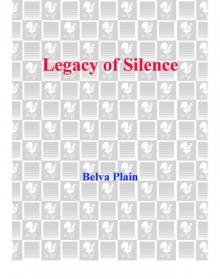 Legacy of Silence
Legacy of Silence Crossroads
Crossroads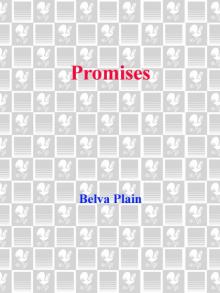 Promises
Promises After the Fire
After the Fire Tapestry
Tapestry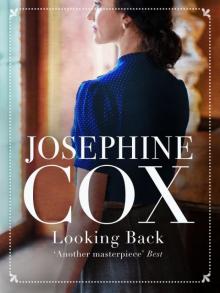 Looking Back
Looking Back Heartwood
Heartwood The Carousel
The Carousel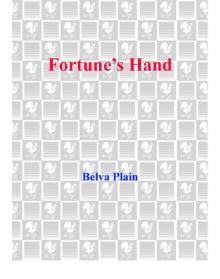 Fortune's Hand
Fortune's Hand Homecoming
Homecoming Random Winds
Random Winds Harvest
Harvest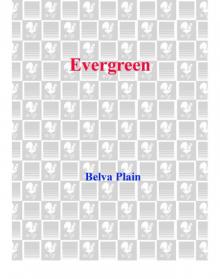 Evergreen
Evergreen Treasures
Treasures The Sight of the Stars
The Sight of the Stars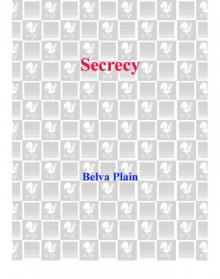 Secrecy
Secrecy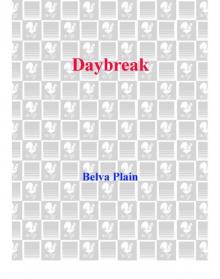 Daybreak
Daybreak Eden Burning
Eden Burning